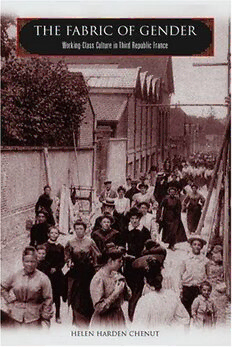Download The Fabric of Gender: Working-Class Culture in Third Republic France PDF Free - Full Version
Download The Fabric of Gender: Working-Class Culture in Third Republic France by Helen Harden Chenut in PDF format completely FREE. No registration required, no payment needed. Get instant access to this valuable resource on PDFdrive.to!
About The Fabric of Gender: Working-Class Culture in Third Republic France
The years of the Third Republic (1870-1940) in France were ones of intense social and economic transformation as workers struggled to defend their rights in the face of growing industrial capitalism. In The Fabric of Gender, Helen Chenut paints a vivid picture of working life during these years by following four generations of laboring women and men in one community, the textile town of Troyes in the Champagne region.In Troyes workers were locked in an adversarial relationship with mill owners, whose monopoly over the labor market in a single-industry town largely determined the workers' future. And yet workers managed to create a counterculture of resistance by founding labor unions, consumer cooperatives, and socialist parties through which they were gradually able to implement change. Women were key actors in this struggle as their garment-making skills became increasingly important to the growing productivity of the knitted textile industry. Drawing upon rich archival records, oral histories, and highly evocative illustrations, Chenut tells a fascinating story of this fight for a 'social republic,' one in which both men and women had the right to work for a living wage and to partake in a consumer society.The Fabric of Gender appears at a time when European labor historians are reexamining their field. Chenut's innovative study of working-class culture--integrating gender, class, politics, and consumption--stands as a model for the expansion of labor history beyond traditional lines of inquiry. --This text refers to the Hardcover edition.
Detailed Information
| Author: | Helen Harden Chenut |
|---|---|
| Publication Year: | 2006 |
| ISBN: | 9780271029924 |
| Pages: | 449 |
| Language: | English |
| File Size: | 3.248 |
| Format: | |
| Price: | FREE |
Safe & Secure Download - No registration required
Why Choose PDFdrive for Your Free The Fabric of Gender: Working-Class Culture in Third Republic France Download?
- 100% Free: No hidden fees or subscriptions required for one book every day.
- No Registration: Immediate access is available without creating accounts for one book every day.
- Safe and Secure: Clean downloads without malware or viruses
- Multiple Formats: PDF, MOBI, Mpub,... optimized for all devices
- Educational Resource: Supporting knowledge sharing and learning
Frequently Asked Questions
Is it really free to download The Fabric of Gender: Working-Class Culture in Third Republic France PDF?
Yes, on https://PDFdrive.to you can download The Fabric of Gender: Working-Class Culture in Third Republic France by Helen Harden Chenut completely free. We don't require any payment, subscription, or registration to access this PDF file. For 3 books every day.
How can I read The Fabric of Gender: Working-Class Culture in Third Republic France on my mobile device?
After downloading The Fabric of Gender: Working-Class Culture in Third Republic France PDF, you can open it with any PDF reader app on your phone or tablet. We recommend using Adobe Acrobat Reader, Apple Books, or Google Play Books for the best reading experience.
Is this the full version of The Fabric of Gender: Working-Class Culture in Third Republic France?
Yes, this is the complete PDF version of The Fabric of Gender: Working-Class Culture in Third Republic France by Helen Harden Chenut. You will be able to read the entire content as in the printed version without missing any pages.
Is it legal to download The Fabric of Gender: Working-Class Culture in Third Republic France PDF for free?
https://PDFdrive.to provides links to free educational resources available online. We do not store any files on our servers. Please be aware of copyright laws in your country before downloading.
The materials shared are intended for research, educational, and personal use in accordance with fair use principles.

